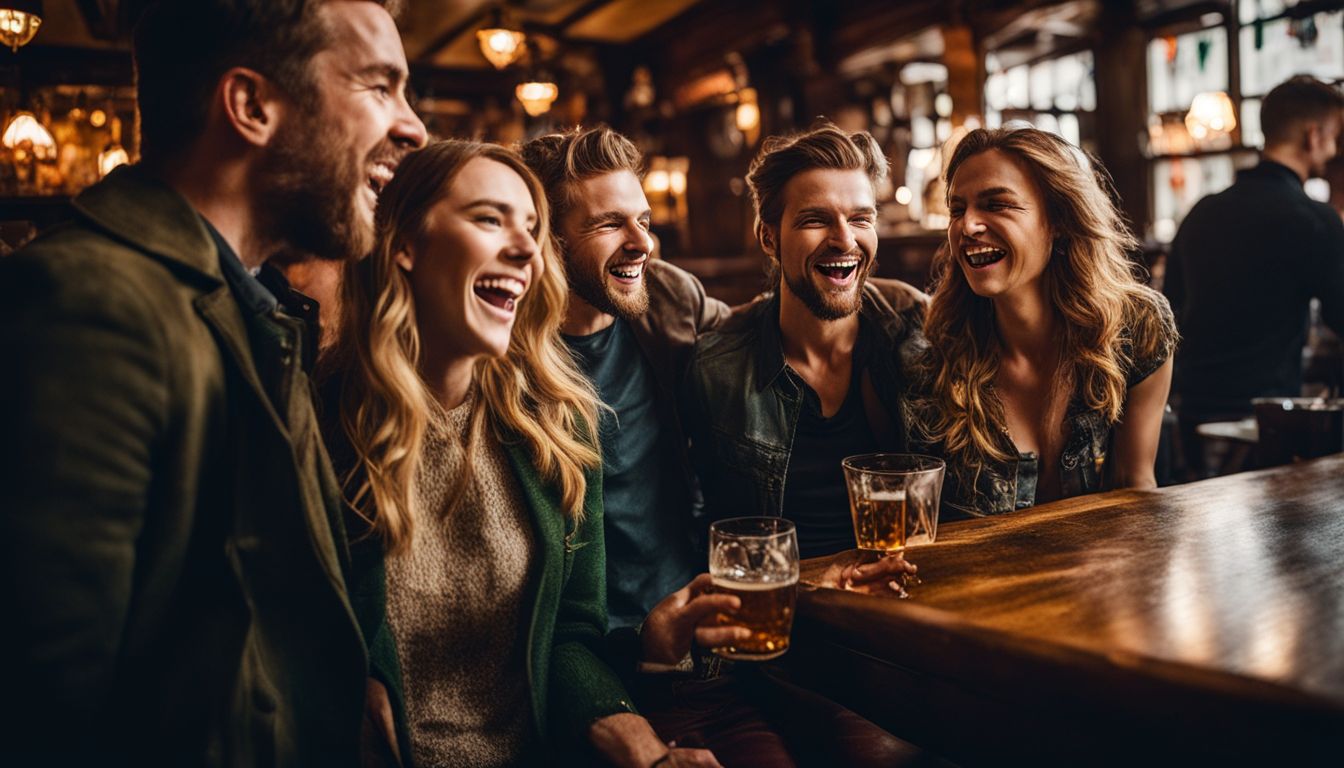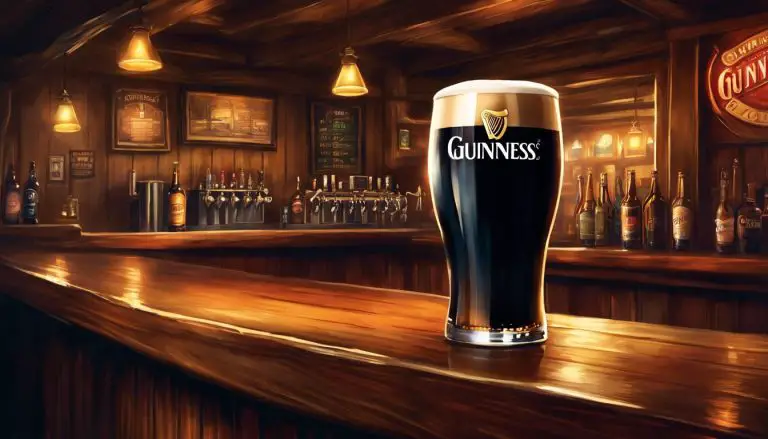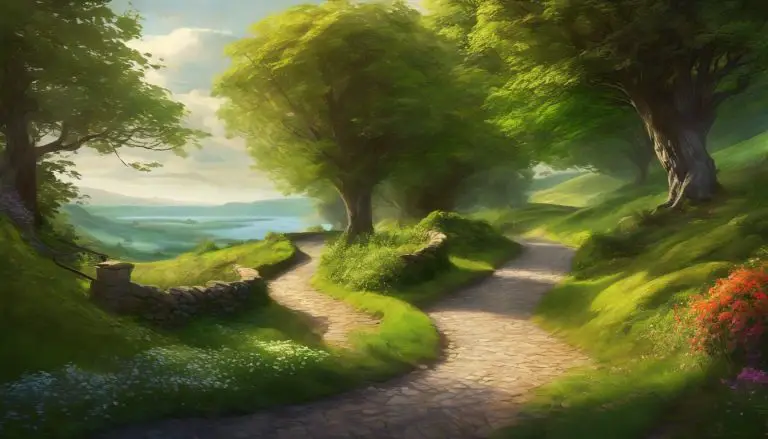Exploring the Rich and Colorful World of Irish Slang
Heading to Ireland but find yourself puzzled by the local lingo? You’re definitely not alone. Much like you, I’ve spent time delving into the colorful tapestry of Irish slang to make sense of it all.
In this article, we’ll navigate together through the lively realm of Irish expressions, from “craic” to “banjaxed.” Ready to dive into a linguistic journey?.
Key Takeaways
- Irish slang mixes Gaelic language and English influences, making a unique way people talk in Ireland. This special mix is called Hiberno-English.
- Slang words like “craic” for fun times, “banjaxed” for something broken, and “deadly” for cool or fabulous are key to chatting with locals. They show Ireland’s culture and history.
- Misunderstanding slang can lead to confusion. For example, “craic” isn’t about drugs but means having a good time. Knowing these meanings helps avoid mistakes when talking.
- Famous slang terms such as “grand,” meaning everything is okay, and “feck,” a softer swear word, offer insight into the daily life and humor of the Irish people.
- Learning Irish slang before visiting can make trips more fun. It helps travelers fit in better and understand what’s going on around them in Ireland.
Understanding Irish Slang
Dive into the world of Irish slang, its definition, and rich history. Discover the origins and evolution of Irish slang to gain a deeper understanding.
Definition and history of Irish slang
Irish slang is a colorful and essential part of Ireland’s culture. It shapes the way locals communicate with warmth and camaraderie. The origins of Irish slang trace back to the Gaelic language, with influences from English due to historical colonization.
This unique blend gives rise to Hiberno-English, a distinct version of English spoken in Ireland.
Over time, Irish slang has grown rich with expressions reflecting Ireland’s history, traditions, and landscapes. These phrases add depth to conversations beyond what standard English offers.
By learning some local jargon before visiting Ireland, travelers can connect more deeply with its people and vibrant culture.
Top 20 Irish Slang Words and Phrases
Discover the vibrant world of Irish slang with these top 20 words and phrases. Unravel more about the colorful language!
Craic
Craic is a vital part of Irish social life, meaning fun, gossip, and good times. It underpins the warm and lively nature of Irish culture. When it comes to experiencing Ireland authentically, understanding this word is crucial.
Not only does knowing its meaning unlock the secrets of Irish conversations, but it also enhances your interactions with locals and adds depth to your travel experience.
Irish slang like “craic” plays a significant role in building camaraderie with the locals. Its unique usage is designed to enhance your time in Ireland, allowing you to navigate its everchanging social complexities more easily.
Banjaxed
When it comes to Irish slang, “banjaxed” is a word you’ll hear often. It means something is broken or ruined. The locals use it casually in everyday conversations and understanding its meaning adds depth to interactions with the Irish people.
Ireland’s rich culture and traditions are deeply intertwined with its unique language expressions, making it essential for travelers to grasp these colloquialisms before embarking on their journey.
Travelers should delve into the world of Irish slang to unlock the secrets of this vibrant language, enhancing their experience in the heart of Ireland. Understanding phrases like “banjaxed” not only enriches communication but also allows visitors to navigate local interactions with confidence while exploring the Emerald Isle vernacular.
Deadly
Deadly is a popular Irish slang that doesn’t mean something bad. It actually means something cool or fabulous. So if you hear someone saying “That concert was deadly!”, know they’re not talking about anything negative but rather expressing their excitement and approval.
Understanding the diverse and rich world of Irish slang, like the word “deadly,” can enhance your conversations and experiences while traveling in Ireland. Embracing these unique phrases adds depth to interactions with locals, making your trip even more enjoyable.
Gobsh*te
Ah, “gobsh*te” is an Irish slang term that’s commonly used to describe someone who talks nonsense or acts foolishly. It’s a bit like calling someone a “fool” or “idiot”. When visiting Ireland, it’s important to be aware of the different ways this word might be used in conversation, especially since it varies in intensity depending on tone and context.
The use of “gobsh*te” reflects the unique linguistic charm of HibernoEnglish and adds color to everyday interactions with the locals. While some may find this word offensive, in Ireland, it can often be said with affectionate teasing among friends or family.
Understanding such words not only helps travelers navigate social situations but also allows for a deeper connection with the rich colloquial expressions of Irish culture.
Eejit
Eejit is an Irish slang word for “idiot” or “fool.” It’s used in a lighthearted, teasing manner among friends. Don’t take it to heart; it’s all in good fun and part of the friendly banter you’ll encounter while exploring Ireland.
Understanding these playful jabs will add a touch of warmth and camaraderie to your interactions with the locals. So, if someone calls you an eejit, just laugh it off and join in the craic!
Minus craic
Minusing the craic is like missing out on all the fun and laughter. It’s the lively atmosphere where jokes are shared, stories are told, and everyone feels at home. Being part of it brings a sense of belonging to the rich Irish culture, creating memorable moments with locals.
Understanding this aspect of Irish social life is essential for immersing in their vibrant community and making genuine connections during your travels. So don’t miss out – embrace the craic!
And more!
Explore the fascinating world of Irish slang with unique phrases and expressions that add warmth and camaraderie to your interactions. Ireland’s rich traditions, diverse landscapes, and literary culture bring depth to conversations when you understand essential phrases before visiting.
Delve into hilarious guides with witty illustrations and explanations, adding color to this vibrant tapestry of language.
Uncover differences between Irish and American English terms like “boggin” for “hair tie” or “beer mat” for “coaster,” enriching your understanding of local dialects while immersing yourself in the country’s culture during your travels.
Common Misunderstandings of Irish Slang
Misunderstandings of Irish Slang can lead to confusion and unintended offense. It’s important to be aware of the subtle nuances and cultural context behind the phrases.
Confusing phrases and terms
- Irish Slang can be confusing, but fascinating.
- Some commonly misunderstood phrases and terms include:
- “Craic” – Meaning “fun” or “entertainment,” not drugs
- “Bleedin'” – An intensifier, not an injury
- “Gobsh*te” – Describes a foolish person, not something vulgar
- “Grand” – Means everything is fine, not extravagant
- “Feck” – A polite way to express frustration, not profanity
Ensure to grasp these before immersing yourself in the rich world of Irish slang.
Commonly used phrases for greeting, insulting, and describing someone
When it comes to understanding Irish slang, knowing commonly used phrases for greeting, insulting, and describing someone is essential for engaging with locals. Here are some of the key phrases to be aware of:
- “How’s the form??”: a common way to greet someone and ask how they are.
- “He’s a gas man!“: a light-hearted way to describe someone as funny or entertaining.
- “She’s some craic!“: a compliment meaning that she is great fun to be around.
- “Are you having me on??”: an expression used when doubting if someone is telling the truth.
- “You’re an awful dose!“: a playful insult meaning that you are being difficult or troublesome.
Understanding these phrases will enrich your interactions and help you connect with the vibrant culture of Ireland.
Famous Irish Slang Words
Discover the origins and usage of notable Irish slang words like craic, grand, banjaxed, feck, and more. Explore the fascinating stories behind these popular expressions that add color to the Irish vernacular.
Origin and usage of famous Irish slang words
- The Irish slang word “craic” originates from the Irish language “Gaeilge” and means fun or enjoyment. It’s commonly used to inquire about the atmosphere or how someone is doing, like asking, “What’s the craic?”
- The term “grand” is widely used in Ireland to express approval or contentment, often heard as a response to being asked how things are going, like saying, “I’m grand.”
- “Banjaxed” is a popular slang meaning broken or unusable, expressing a sense of hopelessness about something not functioning correctly.
- The word “feck,” derived from the more recognizable expletive, is often used humorously and inoffensively when expressing surprise or annoyance.
- “Deadly” translates unusually – it actually means great or fantastic in Irish slang, often used to describe something impressive or awesome.
- Another common phrase is “bog off,” which means go away and is typically used in a lighthearted manner among friends.
- An amusing slang phrase is “taking the mickey,” which means teasing or making fun of someone in a friendly manner.
- When someone uses the term “bleedin’,” it’s akin to mildly emphasizing something without profanity – for instance, saying somebody’s bleedin’ gorgeous means they’re very attractive.
- A less known yet intriguing phrase is “yer man” or “yer wan,” referring ambiguously to whoever was previously mentioned and adding an air of mystery to conversations.
- The widely known term “Eejit” denotes someone who’s perceived as acting foolishly and makes appearances regularly in playful banter amongst friends.
- If you hear someone describing another person as a “gobsh*te”, know that it’s not affectionate – it implies that they are being rude or unpleasant.
- An interesting phrase many travelers encounter is “grá mo chroí”, which expresses passionate love beyond romantic connotations; it also encompasses deep platonic love for close friends and family.
- Hearing an Irish local using the word “shift” might be surprising – in Ireland, it refers to kissing passionately rather than moving position generally understood elsewhere.
Craic, grand, banjaxed, feck, and more!
Irish slang adds warmth and camaraderie to conversations while traveling through the emerald hills of Ireland. Understanding phrases like “craic” (meaning fun), “grand” (meaning good), “banjaxed” (meaning broken), and “feck” (a mild expletive) can deepen interactions with the friendly locals.
These words not only add color to the language but also provide insight into Irish culture, creating a more immersive experience for travelers exploring this enchanting land.
When delving into Irish slang, it’s important to note that these colloquial expressions convey a sense of community and humor amongst the Irish people. After gaining an understanding of these colorful phrases, travelers will be better equipped to engage in lively banter at traditional Irish pubs or as they weave their way through bustling markets on their journey through Ireland’s charming landscapes.
Conclusion
Exploring Irish slang brings us closer to the heart of Ireland’s culture. It turns everyday chats into memorable encounters. Now, let’s meet Seán O’Reilly, a linguist with over 20 years diving into the nuances of Irish colloquial expressions.
Holding a Ph.D. in Linguistics from Trinity College Dublin, Seán has published numerous articles on Hiberno-English and its impact on cultural identity. He often highlights how slang words like “craic” and “banjaxed” enrich communication.
Seán believes that understanding these phrases goes beyond mere translation; it’s about grasping the Irish spirit. For example, saying something is “grand” implies a level of satisfaction deeply rooted in cultural optimism.
This insight shows why knowing local jargon can deepen connections with the people.
On safety and ethics, Seán underscores learning slang through respectful engagement rather than appropriation. He advises using resources created by locals to ensure accuracy and sensitivity towards linguistic heritage.
For integrating this colorful language into daily life or travel plans, he suggests starting with common greetings and expressions seen in friendly chats at an Irish pub or across towns’ winding streets.
Immersing oneself slowly ensures genuine appreciation without overwhelming confusion.
Weighing pros and cons, Seán admits while learning slang enhances experiences; it might also lead to misinterpretations without contextual knowledge—suggesting travelers learn phrases within their social situations for clarity.
Ultimately, Seán champions exploring Irish slang as not just beneficial but essential for any traveler aiming for authentically rich interactions in Ireland. His insights confirm that delving into local dialects opens doors to a more vibrant understanding of unique cultures worldwide.
Hello! I’m Ryan Nelson, the heart and soul behind IrishGraves.com. Born in New York City with a rich blend of Irish and Scottish heritage, I’ve always felt a deep pull towards exploring my roots and understanding the cultures that shape me. This passion ignited my journey to Ireland, a land of breathtaking landscapes, profound history, and vibrant culture, leading to the creation of IrishGraves.com.







